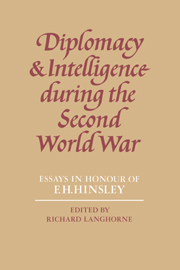Book contents
2 - F. H. Hinsley and a rational world order: an essay in bibliography
Published online by Cambridge University Press: 21 September 2009
Summary
In November, 1947, F. H. Hinsley, then a recently appointed research fellow of St John's College, Cambridge, published his first historical writing. It was a review of Donald W. Mitchell, History of the Modern American Navy in the second number of the Cambridge Journal. Since that time he has written almost without interruption. He is the author of four substantial books, co-author of another, editor of two large collections of studies, one in the New Cambridge Modern History series and one on foreign policy under Sir Edward Grey, and has latterly been the principal author of the official history of British Intelligence during the Second World War. Throughout this span of time he has – with a brief interruption in the later years of his career – been a busy reviewer of the works of others. There is scarcely an important book on international relations, war, peace, armies, navies or diplomacy published in English in the last three and a half decades that Hinsley has not reviewed. He has also published several important articles and public lectures.
A review of this considerable body of written work must start by noting two unusual features. The first is that Hinsley has never done conventional research. He has not even produced the inevitable Ph.D., off which in subsequent years ordinary historians slice bits to make articles. Hinsley never did a Ph.D. for the same reason that he never took his B.A. because the Second World War occupied him from 1939 to 1947.
- Type
- Chapter
- Information
- Diplomacy and Intelligence During the Second World WarEssays in Honour of F. H. Hinsley, pp. 12 - 21Publisher: Cambridge University PressPrint publication year: 1985
- 1
- Cited by



